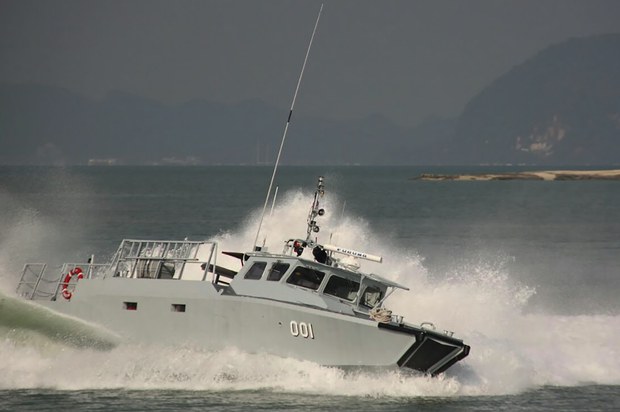Indonesia, Malaysia and the Philippines Seek Coordinated Air-Sea Patrols
2016.06.20
Kuala Lumpur
 A Royal Malaysian Navy combat boat sets out on a routine patrol in the South China Sea in the handout photo, Oct. 6, 2014.
A Royal Malaysian Navy combat boat sets out on a routine patrol in the South China Sea in the handout photo, Oct. 6, 2014.
Defense ministers from Indonesia, Malaysia and the Philippines on Monday agreed in Manila to pursue coordinated air-and-sea surveillance in a joint effort to halt kidnappings by Abu Sayyaf militants in the Sulu and Celebes seas.
Such surveillance would be modeled on the Malacca Strait Patrols (MSP), a system of air-and-sea operations coordinated by Indonesia and Malaysia in the Andaman Sea, according to a trilateral statement issued at the end of Monday’s meeting in the Philippine capital.
The Malacca Strait model had significantly reduced hijackings in that maritime zone, Malaysian Defense Minister Hishammuddin Tun Hussein said.
“Threats in Sulu waters cannot be eradicated without cooperation from neighboring countries which share borders,” he said in a statement following the meeting in Manila.
Joining Hishammuddin there were his Indonesian and Philippine counterparts, Ryamizard Ryacudu and Voltaire T. Gazmin.
In their joint statement, the ministers said the three neighboring countries had agreed to establish a trilateral maritime patrol working group, which would set operational plans for those patrols.
“The ministers raised concern over the recent incidents of kidnappings and armed robbery at sea in the maritime areas of common concern, and reaffirmed the need, commitment and collective responsibility of the countries to address such threats that undermine peace, security and prosperity of the region,” the statement said.
The three countries also agreed to establish a transit corridor designating sea lanes for mariners entering the common area, and share information and intelligence by establishing a trilateral database.
Monday’s meeting enhances efforts by members of the Association of Southeast Asian Nations (ASEAN) to combat crime and terrorism, according to Zaini Othman, director of the Center for Strategic and Security Studies at Universiti Malaysia Sabah.
“I see this agreement as a reflection of the seriousness among the three countries to address these issues,” he told BenarNews.
Second trilateral meeting
Monday’s talks reaffirmed commitments made at a similar meeting in Jakarta on May 5, when foreign ministers from the three countries agreed to a four-point plan to stop hijackings in the seas separating the southern Philippines from Borneo island. They agreed to establish three-way hotlines and coordinate maritime patrols.
The efforts are occurring as the three nations deal with a series of kidnappings by Abu Sayyaf and other militant groups in the Philippines.
Most recently, four Malaysian sailors were released June 8 after being held by Abu Sayyaf for two months. Their families claimed they paid 12 million ringgit (U.S. $2.94 million) for their release while Malaysian officials claimed that the money did not go to the militant group.
Previously, four Indonesian sailors were released by a different Philippine militant group on May 11, and 10 Indonesian sailors kidnapped by Abu Sayyaf were released on May 1.







